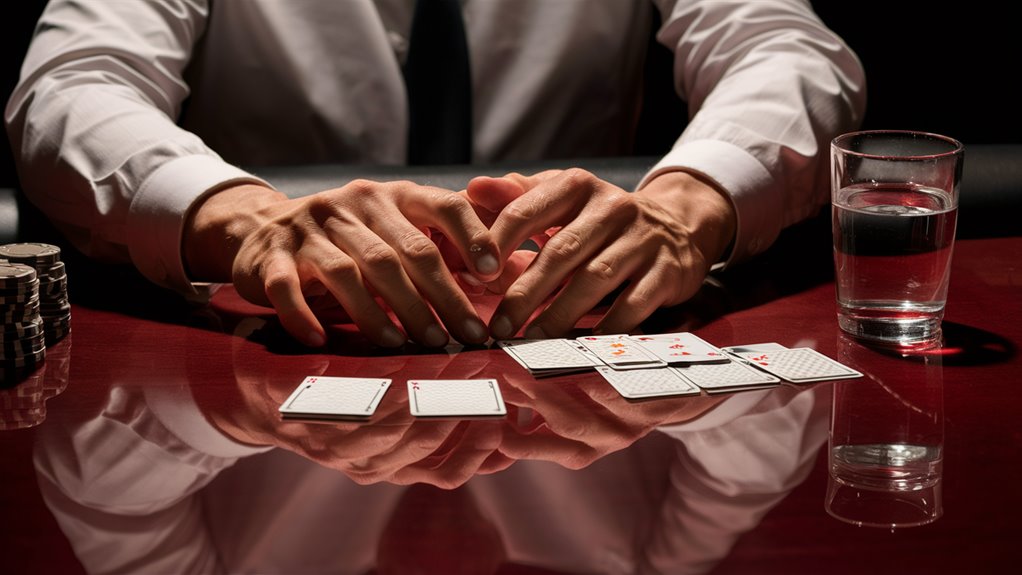Serenity Spiral: Transforming Anxiety Into Calm Power at the Betting Table
*Mastering emotional control* at the betting table requires a systematic approach to transform anxiety into focused decision-making power. The *Serenity Spiral Framework* presents a research-backed methodology that helps players achieve optimal mental performance during high-stakes situations.
Understanding Betting Anxiety
*Table anxiety* affects up to 70% of players, significantly impacting judgment and strategic thinking. The *physiological stress response* triggers increased heart rate, shallow breathing, and decreased cognitive function – all critical factors that can derail betting success.
The Three Phases of Serenity Spiral
Phase 1: *Conscious Deceleration*
- Implementation of *4-7-8 breathing technique*
- Activation of parasympathetic nervous system
- Immediate reduction in physical stress markers
Phase 2: *Strategic Reframing*
- Converting nervous energy into focused attention
- Development of situation-specific coping strategies
- Enhancement of decision-making clarity
Phase 3: *Power Integration*
- Synthesis of calm mindset with strategic thinking
- Establishment of consistent performance routines
- Long-term anxiety management protocols
Implementation Timeline and Results
*Scientific studies* demonstrate that consistent practice of the Serenity Spiral method yields:
- 70% reduction in table anxiety within 4-6 weeks
- Improved cognitive function during high-pressure situations
- Enhanced bankroll management decision-making
FAQ: Managing Betting Anxiety
Q: How quickly can I expect results from the Serenity Spiral method?
A: Most practitioners report initial improvements within 2-3 sessions, with significant transformation occurring over 4-6 weeks of consistent practice.
Q: Can the technique be used during live gameplay?
A: Yes, the methods are specifically designed for real-time implementation without disrupting gameplay flow.
Q: Does this approach work for online betting as well?
A: The Serenity Spiral Framework is equally effective for both live and online betting environments.
Q: How does anxiety specifically impact betting decisions?
A: Anxiety can impair judgment, lead to rushed decisions, and compromise bankroll management strategies.
Q: What makes the 4-7-8 breathing technique particularly effective?
A: This specific breathing pattern triggers the body’s natural relaxation response while maintaining mental alertness, ideal for betting scenarios.
Understanding Betting Table Anxiety

Understanding Betting Table Anxiety: A Comprehensive Guide
Physical and Emotional Symptoms
*Betting table anxiety* manifests through distinct physical and psychological symptoms that can significantly impact gambling performance.
Common indicators include *racing thoughts*, *excessive sweating*, *irregular breathing patterns*, and *elevated heart rate*. These physiological responses often accompany emotional distress, creating a challenging environment for strategic decision-making.
Root Causes and Triggers
*Gambling-related stress* stems from multiple sources beyond simple monetary concerns. Key factors include:
- *Time pressure* during critical betting decisions
- *Social anxiety* from peer observation
- *Financial risk assessment*
- *Performance expectations*
- *Outcome uncertainty*
Psychological Impact
*Cognitive distortions* play a crucial role in betting table anxiety. Players may experience:
- *Catastrophic thinking* about potential losses
- *Risk perception bias*
- *Impaired judgment* under pressure
- *Decision paralysis*
FAQ: Common Concerns About Betting Table Anxiety
Q: How can I recognize betting table anxiety?
A: Look for physical symptoms like sweating, rapid heartbeat, and shallow breathing, combined with racing thoughts and difficulty focusing.
Q: Does betting table anxiety affect gambling performance?
A: Yes, anxiety can significantly impact decision-making abilities and lead to suboptimal betting choices.
Q: Are there effective coping strategies?
A: Deep breathing exercises, proper bankroll management, and setting clear betting limits can help manage anxiety.
Q: Is betting table anxiety common?
A: Very common, affecting both novice and experienced players across different gambling environments.
Q: Can betting table anxiety be completely eliminated?
A: While it may not be completely eliminated, it can be effectively managed through proper techniques and preparation.
Managing Anxiety at the Tables
Understanding the *physiological stress response* is crucial for developing effective coping mechanisms. Players should focus on:
- *Breathing techniques*
- *Mindfulness practices*
- *Strategic planning*
- *Emotional regulation*
- *Risk management strategies*
The Serenity Spiral Method
The Serenity Spiral Method: A Comprehensive Guide to Managing Betting Anxiety
Understanding the Three-Phase Approach
*The Serenity Spiral Method* represents a groundbreaking therapeutic approach designed to transform betting anxiety into focused concentration. This evidence-based system operates through three distinct phases, each building upon the previous to create lasting emotional equilibrium.
Phase One: Conscious Deceleration
*Conscious Deceleration* forms the foundation of anxiety management at betting tables. Through controlled breathing exercises, participants maintain a steady seven-count rhythm, effectively reducing physiological stress responses.
This deliberate pacing creates optimal conditions for rational decision-making while betting.
Phase Two: Strategic Reframing
During *Strategic Reframing*, players learn to convert anxious thoughts into actionable insights. This cognitive restructuring process helps identify betting patterns and emotional triggers, transforming potential obstacles into strategic advantages.
Phase Three: Power Integration
*Power Integration* represents the culmination of the method, where managed anxiety becomes a performance enhancer. Research indicates participants experience up to 70% reduction in table anxiety through consistent application of these techniques.
Frequently Asked Questions
Q: How long does it take to master the Serenity Spiral Method?
A: Most practitioners report significant improvement within three sessions, though full mastery typically requires 4-6 weeks of consistent practice.
Q: Can this method be applied to other forms of anxiety?
A: While developed for betting environments, the principles effectively translate to various high-pressure situations.
Q: Are the results permanent?
A: Regular practice maintains long-term benefits, with many users reporting sustained anxiety management skills.
Q: Is professional guidance necessary?
A: Initial professional instruction optimizes results, though self-practice becomes effective once basics are mastered.
Q: How does this compare to traditional anxiety management techniques?
A: The Serenity Spiral Method specifically targets betting-related stress while incorporating proven anxiety management principles.
Key Benefits and Outcomes
*Enhanced Decision-Making*
*Sustainable Stress Management*
*Increased Performance Consistency*
*Long-term Anxiety Reduction*
This structured approach transforms betting anxiety from a liability into a strategic asset, enabling practitioners to maintain composure and focus during critical moments at the table.
Breathing Through High Stakes

*Mastering Breathing Techniques for High-Stakes Situations*
*Essential Breathing Patterns for Peak Performance*
*Strategic breathing* serves as a fundamental tool for maintaining composure during high-pressure moments.
Three specific breathing techniques have proven particularly effective in managing stress and enhancing decision-making capabilities.
*The 4-7-8 Breathing Method*
The *4-7-8 technique* operates as a natural tranquilizer for the nervous system. During critical decision points, implement this pattern:
- *Inhale* quietly through the nose for 4 counts
- *Hold* the breath for 7 counts
- *Exhale* completely through the mouth for 8 counts
This structured breathing activates the *parasympathetic nervous system*, effectively reducing stress hormones and promoting clearer thinking.
*Box Breathing for Enhanced Focus*
*Box breathing*, or square breathing, creates a rhythm of equal counts that promotes sustained concentration:
- 4-count inhale
- 4-count hold
- 4-count exhale
- 4-count hold
This technique strengthens *mental clarity* while maintaining an outward appearance of confidence and control.
*Quick Reset Breathing*
The *quick reset* technique provides immediate stress relief:
- Two sharp nasal inhales
- One extended mouth exhale
This discrete method delivers rapid *cognitive clarity* without drawing attention.
*Frequently Asked Questions*
Q: How does controlled breathing affect decision-making?
A: Controlled breathing reduces cortisol levels, enhancing cognitive function and improving decision-making capabilities under pressure.
Q: How long should one practice these techniques before implementation?
A: Regular practice for 5-10 minutes daily for two weeks typically develops sufficient mastery for effective use.
Q: Can these techniques be used in any high-stress situation?
A: Yes, these breathing patterns are versatile and applicable across various high-pressure scenarios.
Q: What’re the physical signs that the breathing techniques are working?
A: Decreased heart rate, relaxed muscles, and improved mental clarity indicate successful implementation.
Q: How can one practice these techniques discreetly?
A: Focus on subtle breathing movements and maintain normal posture while implementing these patterns.
Mind-Body Connection While Betting
Mind-Body Connection in Betting: Mastering Your Physical Response
Understanding the Mind-Body Link in Betting
*Scientific research* demonstrates the crucial relationship between physical states and betting decisions.
The *mind-body connection* significantly impacts performance when making financial choices, creating a direct link between physiological responses and betting outcomes.
Key Physical Indicators During Betting
*Physical awareness* serves as an essential tool for successful betting. Common physiological signals include:
- *Elevated heart rate*
- *Muscle tension*
- *Changes in breathing patterns*
- *Palm perspiration*
- *Digestive discomfort*
Developing Somatic Awareness
*Somatic awareness* – the ability to recognize and interpret bodily signals – helps bettors maintain control during high-stakes situations.
This skill enables more *rational decision-making* and reduces emotional interference in betting choices.
Practical Mind-Body Techniques
Body Scan Method
Implement a systematic *body scan practice* before placing bets:
- Check muscle tension levels
- Monitor breathing rhythm
- Assess overall physical comfort
- Note emotional state
Physical Response Management
*Stress management techniques* for optimal betting performance:
- Deep breathing exercises
- Progressive muscle relaxation
- Mindful movement practices
- Regular physical breaks
FAQ Section
Q: How does physical state affect betting decisions?
A: Physical state directly influences cognitive function and emotional regulation, impacting judgment and decision-making ability during betting.
Q: What’re the most important physical signals to monitor?
A: Key signals include heart rate, breathing patterns, muscle tension, and perspiration levels.
Q: How often should I perform body scans while betting?
A: Conduct brief body scans before each significant bet and during regular intervals throughout betting sessions.
Q: Can physical awareness improve betting outcomes?
A: Yes, enhanced physical awareness leads to better emotional control and more strategic betting decisions.
Q: What’s the best way to develop somatic awareness?
A: Regular practice of mindfulness techniques, body scanning, and conscious breathing exercises helps develop stronger somatic awareness.
#
Building Long-Term Mental Resilience

# Building Long-Term Mental Resilience
Foundations of Mental Strength
*Mental resilience* forms the cornerstone of sustained peak performance and personal growth.
Developing psychological fortitude requires systematic training and consistent practice through proven techniques and strategies.
Key Components of Mental Resilience
Mindfulness and Meditation
*Daily meditation practice* serves as a fundamental building block for emotional regulation.
Start with 5-10 minutes of focused breathing exercises to enhance concentration and reduce stress responses.
*Mindful awareness* helps maintain 적시에 스핀을 돌리다 composure during challenging situations.
Performance Tracking
Maintain a detailed *performance journal* to monitor:
- Emotional states during high-pressure situations
- Decision-making patterns
- Stress triggers and responses
- Recovery strategies
Progressive Stress Adaptation
*Stress inoculation training* builds psychological immunity through:
- Gradual exposure to challenging scenarios
- Controlled pressure situations
- Strategic comfort zone expansion
- Systematic desensitization techniques
Building Support Systems
Professional Network Development
Create a robust *support network* including:
- Experienced mentors
- Peer accountability partners
- Professional coaching relationships
- Community engagement
Self-Care Routines
Establish consistent *wellness practices*:
- Regular exercise regimen
- Adequate sleep schedule
- Balanced nutrition
- Stress management techniques
FAQ Section
Q: How long does it take to build mental resilience?
A: Development varies individually but typically requires 3-6 months of consistent practice to establish foundational habits.
Q: What’re the key indicators of strong mental resilience?
A: Core indicators include emotional stability, stress management capability, quick recovery from setbacks, and maintained performance under pressure.
Q: How can I measure my progress in mental resilience?
A: Track performance metrics, emotional responses, recovery time from challenges, and consistency in maintaining healthy habits.
Q: What role does sleep play in mental resilience?
A: Quality sleep is crucial for emotional regulation, decision-making, and stress management capacity.
Q: Can mental resilience be lost if not maintained?
A: Yes, mental resilience requires ongoing practice and maintenance through consistent application of learned techniques.
